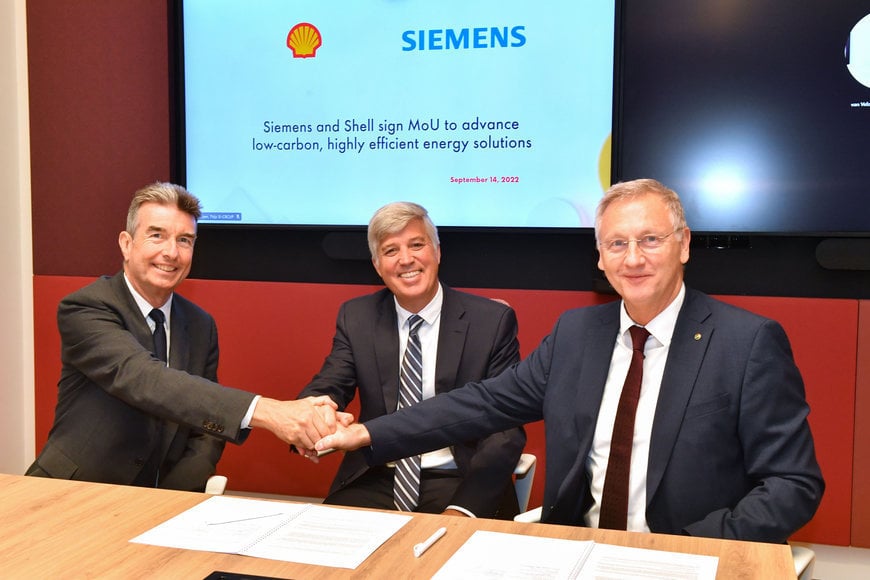Siemens and Shell sign MoU to advance low- carbon, highly efficient energy solutions
Siemens Smart Infrastructure and Shell Global Solutions International BV have signed a Memorandum of Understanding (MoU) to collaborate on developing low- carbon and highly efficient energy solutions that support the energy transition.

- Companies to work together to speed up energy transition
- Partnership to focus on green hydrogen projects at Shell and its customers
- Holland Hydrogen 1 project in Rotterdam key milestone in partnership to advance green hydrogen
The agreement will focus on projects that produce green hydrogen for industrial applications at Shell and its customers, as well as enhancing collaboration in the areas of biofuels and circular chemistry. Under the MoU, Siemens and Shell will create solutions that increase energy efficiency and generate sustainable power, consisting of, but not limited to, digitalization, efficient networks, and the production, distribution, and application of green hydrogen. The partnership, inked with Siemens’ Electrification and Automation business unit, has the potential to strengthen synergies for both parties. While Siemens intends to work with Shell to accelerate the latter’s transition towards net-zero operations, Shell seeks to supply Siemens and its affiliates with low carbon products that reduce emissions across the supply chain, in Siemens’ operations, and in the use phase of Siemens products, consisting of but not limited to supply of biofuels.
“Siemens is committed to decoupling electrification from fossil fuel resources. Partnerships are key to driving this effort and transitioning towards sustainable energy supplies,” said Stephan May, CEO of Electrification and Automation at Siemens Smart Infrastructure. “The partnership with Shell fits perfectly with Siemens’ vision of electrifying the world, while helping industry and infrastructure customers reduce their carbon footprint and achieve their sustainability goals.”
Siemens has been an electrical equipment – switchgears, pumps, transformers, electrical Scada - supplier to Shell for more than a decade. Over the past years, it has evolved into a collaborative solutions supplier, spanning the full range of its electrification and automation portfolio and further enhanced by Joint Industry Programme 33 (JIP33) equipment standardization, a set of standardized industry procurement specifications for the oil and gas industry. Shell attaches great importance to the relationship with Siemens, which is paving the way to accelerating the energy transition.
“Deep collaboration with partners is essential for the delivery of low-carbon energy solutions for the future. Building on our existing relation with Siemens, I expect this MoU to enable our teams to work even closer together,” said Graham Henley, Senior Vice President Engineering & Project Capability at Shell. “Siemens’ broad range of expertise in electrification and automation, together with Shell’s engineering and project delivery capability and ambition in the energy transition will prove to be a powerful combination.”
The MoU stems from this relationship and from working together on several projects since 2010. One of the key milestones advancing green hydrogen is the recently announced construction of Shell’s Holland Hydrogen 1 (HH1) project on the Maasvlakte in Rotterdam. With a capacity of 200 megawatts and 60 tons of hydrogen per day, HH1 is planned to be one of the largest green hydrogen production plants in the world and the biggest in Europe. Siemens’ Electrification and Automation business plays an important role in the project’s planning, construction, and execution, as the power distribution and substation automation supplier. It will also be involved in the operation of the plant, which is scheduled to go on-line in 2025, through a servicing contract. The plant will produce hydrogen using electricity generated by wind turbines in the North Sea.
Siemens and Shell have adopted a collaborative and agile way of working on this large project. Close consultation and decision-making on a daily basis have helped reduce development time – of the design of the power distribution system - by close to half, from 18 months to 9 months, as of the publication of this release.
www.siemens.com

